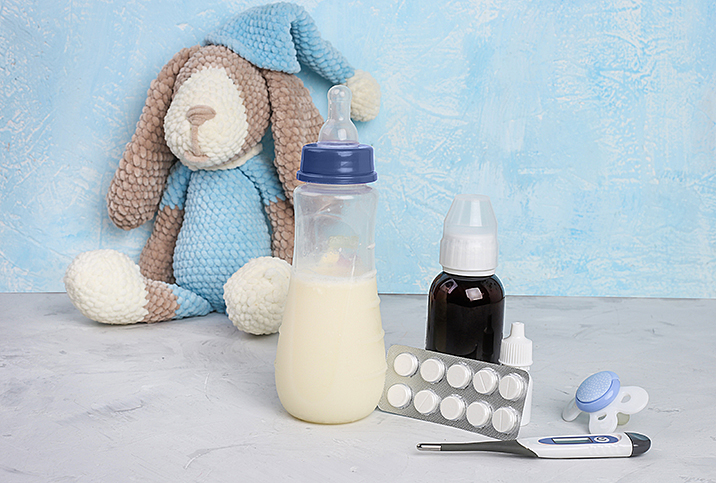How to Manage Prenatal Anxiety

There's a lot more awareness these days about mental health after birth, however, there's still limited discussion about what happens to your mind during pregnancy. For many pregnant people, anxiety can be a major issue, with around 15 percent of women experiencing a significant anxiety problem at some point during pregnancy or in the first year after having a baby.
Prenatal anxiety can manifest as anxiety about the pregnancy, birth or baby, or a specific anxiety problem such as panic attacks, phobias, post-traumatic stress or obsessive-compulsive disorder, said Fiona Challacombe, Psy.D., a clinical psychologist and researcher in the United Kingdom and one of the authors of "Break Free from Maternal Anxiety: A Self-Help Guide for Pregnancy, Birth and the First Postnatal Year," a new book on the topic.
"Some recent big research studies have highlighted that prenatal anxiety is at least as common as depression, although they often go together," she said.
Despite this commonality, the condition lacks awareness and can be underdiagnosed.
"Prenatal anxiety is often ignored and commonly put down to fluctuations in the balance of hormones during pregnancy," said Semiya Aziz, M.B.B.S., a London-based general practitioner who specializes in women's health and mental health.
Women may be embarrassed to talk about their anxiety because they fear being dismissed.
"There appears to be a lack of social awareness or discussions around this common condition," Aziz said, leading to many women facing their anxiety alone.
"Pregnancy is a time of big changes, emotionally, physically and socially, so it's often assumed that anxiety is a normal part of this," Challacombe said. "Some anxious thoughts are normal in pregnancy, however, when anxiety persists, is much more than you would expect in the situation and is having an impact on your daily life and functioning, then it is likely to be an anxiety problem."
Why does prenatal anxiety happen and what are the symptoms?
Prenatal anxiety can affect anyone, but a history of anxiety or traumatic situations can increase the likelihood.
"Social stressors like intimate partner violence and poverty play a big role and are, unfortunately, very common," Challacombe said. "Prenatal anxiety is also more common if you experience pregnancy complications and if the pregnancy is unplanned or unwanted."
Anxiety can be caused by concerns about the health of the unborn baby, giving birth or the ability to look after a newborn.
"A previous pregnancy loss or miscarriage can often create anxiety about subsequent pregnancies," Aziz said.
Both parents can experience prenatal anxiety, not just the pregnant partner, and the condition can affect both your mind and body. While we are all used to a certain level of anxiety, prenatal anxiety takes it to the next level.
"[It often includes] feelings of dread, frequent worries and thoughts that things will go wrong," Challacombe said. "Some common specific problems are intrusive thoughts of deliberately or accidentally harming the baby, flashbacks and anxiety about past traumatic events, uncontrollable worry about the pregnancy or other topics, and fears of being judged by others."
Other symptoms can include panic attacks, feelings of restlessness, irritability, being on edge all the time, insomnia and muscular tension.
What should you do if you experience it?
"There are tried-and-tested methods to deal with anxiety, even if your situation is difficult. It can get better," Challacombe said.
The various treatment options for prenatal anxiety include therapy, self-help resources, medication or a combination of these treatments.
"If you feel you may be experiencing symptoms of prenatal anxiety, it is important to remember that you are not alone," Aziz said. "The sooner you seek help, the quicker you will be able to control the anxious thoughts and feelings and begin to enjoy your pregnancy."
Counseling and psychological therapies can give you space to talk through your feelings and learn tools and strategies to manage the symptoms and thought processes associated with the anxiety, Aziz said.
"Cognitive behavioral therapy can be helpful by focusing on looking at the challenges faced with anxiety and implementing changes around the thought processes," Aziz added.
'If you feel you may be experiencing symptoms of prenatal anxiety, it is important to remember that you are not alone.'
Self-help resources, such as books and online courses, can help you learn skills and techniques to manage anxiety.
"The treatments can work very well. However, accessing these can involve a wait, or they are simply not available for some," Challacombe said. "We know that self-help books can really help people in these situations as they can help you realize that your problem is understandable and that there are strategies and tools that can help."
Lifestyle measures, such as meditation, mindfulness, quality sleep, physical exercise and a healthy diet, can have a positive effect on anxiety, and some women benefit from finding informal peer support.
Some types of medication can help manage anxiety and are safe to take while pregnant.
"If symptoms are severe and functioning on a day-to-day basis becomes troublesome, medications such as selective serotonin reuptake inhibitors [SSRIs] or tricyclic antidepressants may be effective and are safe in pregnancy," Aziz said. "They do not cause birth defects but need to be issued on an individual basis by a healthcare professional who will weigh up the pros and cons of prescribing medication during pregnancy."
Talk things through with a trusted professional, like a midwife or your doctor, who can help you understand what support is right for you.




















